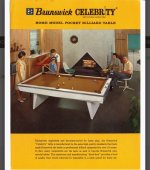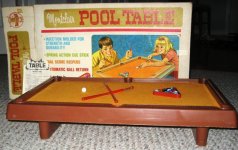drop_pocket
New member
Hi all,
I noticed that it seems like most of the top shooters at the rooms I play in have a table at home. In fact, one of them told me you really need a home table if you want to get that good.
I know home tables have been around for ages. Didn't Thomas Jefferson have one? And later, Elvis?
But I imagine many of the greatest of the great players did not. I bet (just given average house size and wealth of the olden days) that many many of the best of the 20th century never had home tables, or at least not until late in life.
So, when did home tables become so popular? Why do you think that is? How important do you think a home table is to developing skills?
I noticed that it seems like most of the top shooters at the rooms I play in have a table at home. In fact, one of them told me you really need a home table if you want to get that good.
I know home tables have been around for ages. Didn't Thomas Jefferson have one? And later, Elvis?
But I imagine many of the greatest of the great players did not. I bet (just given average house size and wealth of the olden days) that many many of the best of the 20th century never had home tables, or at least not until late in life.
So, when did home tables become so popular? Why do you think that is? How important do you think a home table is to developing skills?

